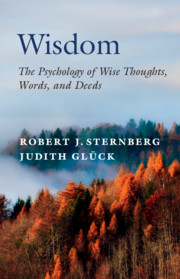Book contents
- Wisdom
- Wisdom
- Copyright page
- Dedication
- Contents
- Figures and Table
- Preface
- 1 What Is Wisdom?
- 2 Why Is Wisdom Important and Why Doesn’t Society Always See It That Way?
- 3 How Has Wisdom Been Studied in Psychology?
- 4 How Is Wisdom Measured?
- 5 How Does Wisdom Develop?
- 6 How Do We Cultivate Wisdom?
- 7 How Is Wisdom Related to Other Psychological Characteristics?
- 8 Am I Wise?
- Epilogue
- Index
1 - What Is Wisdom?
Published online by Cambridge University Press: 07 October 2021
- Wisdom
- Wisdom
- Copyright page
- Dedication
- Contents
- Figures and Table
- Preface
- 1 What Is Wisdom?
- 2 Why Is Wisdom Important and Why Doesn’t Society Always See It That Way?
- 3 How Has Wisdom Been Studied in Psychology?
- 4 How Is Wisdom Measured?
- 5 How Does Wisdom Develop?
- 6 How Do We Cultivate Wisdom?
- 7 How Is Wisdom Related to Other Psychological Characteristics?
- 8 Am I Wise?
- Epilogue
- Index
Summary
This chapter defines wisdom and discusses its relevance to life. In particular, it highlights wisdom as the search for a common good, by balancing one’s own, others’, and larger interests over the long- as well as the short-term through the infusion of positive ethical values. The chapter gives an extended example of how this definition applies in a real-life-type of situation. The chapter discusses each of the elements of wisdom in detail. It also provides some quiz material for people to try out these ideas for themselves. It relates wisdom to moral development, discussing in particular Kohlberg’s theory. It also discusses the relevance of Haidt’s theory of morality to wisdom. It further discusses how wisdom relates to ethical action, presenting a model of how ethical thought proceeds and how it is translated into action. Finally, it discusses how wisdom can be applied through either adapting to the environment, shaping the environment, or selecting a new environment.
Keywords
- Type
- Chapter
- Information
- WisdomThe Psychology of Wise Thoughts, Words, and Deeds, pp. 1 - 27Publisher: Cambridge University PressPrint publication year: 2021

